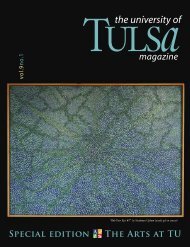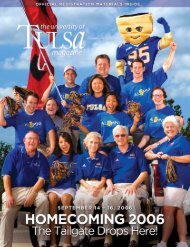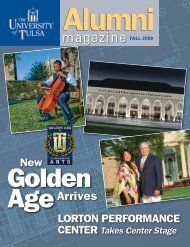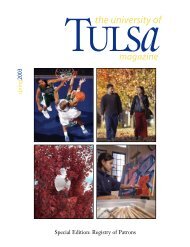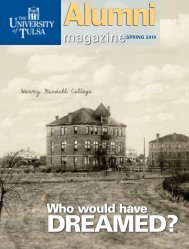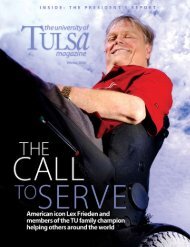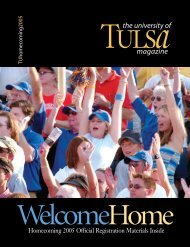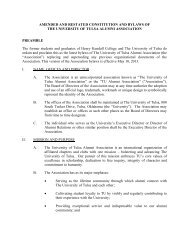The University of Tulsa Magazine - TUAlumni.com
The University of Tulsa Magazine - TUAlumni.com
The University of Tulsa Magazine - TUAlumni.com
Create successful ePaper yourself
Turn your PDF publications into a flip-book with our unique Google optimized e-Paper software.
Photo by Michael Wyke<br />
Making a Difference<br />
Computer security program builds on tradition to put TU<br />
on the map as an industry leader and a national resource<br />
By Doug Fishback<br />
This time last year, when <strong>The</strong> <strong>University</strong> <strong>of</strong> <strong>Tulsa</strong><br />
had been named one <strong>of</strong> six institutions to pioneer the<br />
National Science Foundation’s Cyber Corps program,<br />
no one could have guessed the new sense <strong>of</strong> urgency<br />
that would engulf national security efforts as 2001<br />
drew to a close.<br />
Now, as the U.S. anticipates terrorist attacks and<br />
scrambles to update security measures, TU’s leadership<br />
in information security is <strong>com</strong>ing into sharper<br />
focus as a national asset. <strong>The</strong> <strong>University</strong>’s efforts,<br />
housed in the TU Center for Information Security<br />
(CIS), have attracted repeated recognition and an<br />
encouraging level <strong>of</strong> funding in recent years, putting<br />
TU on the map as a bastion <strong>of</strong> <strong>com</strong>puter security<br />
innovation and education.<br />
This fall marked the first semester <strong>of</strong> the Cyber<br />
Corps program, which subsidizes <strong>com</strong>puter security<br />
From left: Pr<strong>of</strong>essor Sujeet Shenoi and graduate students Gavin Manes, Julie Evans and<br />
Rick Ayers are helping put TU on the map as a leader in information security.<br />
education for a highly select group <strong>of</strong> students. In<br />
exchange, participants fulfill program requirements,<br />
which include earning federal certifications in information<br />
security, <strong>com</strong>pleting a federal internship and, after<br />
graduation, serving a term working for the government<br />
as a <strong>com</strong>puter security expert. TU’s share <strong>of</strong> program<br />
funding is $2.8 million over three years.<br />
<strong>The</strong> Cyber Corps program has an inaugural class <strong>of</strong><br />
32 students nationwide, 10 <strong>of</strong> whom are at TU. This<br />
group includes a 42-year-old mom working toward a<br />
master’s degree, a 30-year-old ex-pr<strong>of</strong>essional rock guitarist,<br />
and a 63-year-old retired engineer.<br />
If these do not seem like your typical students, that<br />
is because Cyber Corps is not a typical program.<br />
Participants have distinguished themselves through<br />
their academic abilities, personal determination, and<br />
their <strong>com</strong>mitment to national service.<br />
A leader in<br />
information<br />
security<br />
TU’s leading role in the<br />
Cyber Corps program<br />
underscores the place the<br />
<strong>University</strong> occupies on the<br />
vanguard <strong>of</strong> <strong>com</strong>puter security<br />
research and education.<br />
Through years <strong>of</strong> quiet program<br />
building and dedicated<br />
work, TU has bootstrapped<br />
itself into a position<br />
<strong>of</strong> prominence in<br />
information security and is<br />
now receiving recognition<br />
and increased support from<br />
federal and private sources.<br />
In addition to being<br />
named a Center <strong>of</strong><br />
Excellence in Information<br />
Assurance by the National<br />
Security Agency (NSA),<br />
TU has received nearly $10<br />
million in grants for information<br />
security education<br />
and research from federal<br />
agencies including the Department <strong>of</strong> Justice and the<br />
National Science Foundation.<br />
Most recently, the NSA and the National Institute<br />
<strong>of</strong> Standards and Technology in October selected<br />
Shenoi as recipient <strong>of</strong> a $691,000 grant to fund development<br />
<strong>of</strong> a high-level network monitoring and defense<br />
system. <strong>The</strong> award is part <strong>of</strong> the Critical Infrastructure<br />
Grants Program sponsored by the Department <strong>of</strong><br />
Commerce. Shenoi’s proposal was one <strong>of</strong> only nine<br />
funded out <strong>of</strong> 133 requests.<br />
<strong>The</strong> grant will support existing efforts at TU’s<br />
Center for Information Security. CIS researchers have<br />
been developing an “immunological approach” to network<br />
security, based on roving agents that patrol a network,<br />
much like the specialized cells in the body’s<br />
immune system. <strong>The</strong> center also has been developing<br />
“war room” tools that monitor networks and present<br />
visual representations <strong>of</strong> <strong>com</strong>puter attacks.<br />
Teaching the teachers<br />
Instead <strong>of</strong> simply producing <strong>com</strong>puter security<br />
workers, TU produces the educators who will bring<br />
along the next generation <strong>of</strong> experts. <strong>The</strong> ideals <strong>of</strong> service<br />
that underlie TU’s participation in the Cyber<br />
Corps program also drive this emphasis on educating<br />
educators.<br />
TU regularly leads the nation in producing <strong>com</strong>puter<br />
science doctorates, the overwhelming majority <strong>of</strong><br />
whom go on to take teaching pr<strong>of</strong>essorships at other<br />
institutions.<br />
Recognizing TU’s role in producing educators, the<br />
U.S. Department <strong>of</strong> Defense has awarded the<br />
<strong>University</strong> a five-year capacity-building grant to<br />
educate <strong>com</strong>puter security pr<strong>of</strong>essors. As part <strong>of</strong> this<br />
plan, the DOD will sponsor graduates from the<br />
National War College to pursue doctoral study in<br />
<strong>com</strong>puter security at TU.<br />
Successful students<br />
Challenge and opportunity have long been the hallmarks<br />
<strong>of</strong> the TU education and particularly <strong>of</strong> the programs<br />
that Shenoi has directed. TU’s involvement in<br />
the current Cyber Corps initiative is an outgrowth <strong>of</strong><br />
the <strong>Tulsa</strong> Undergraduate Research Challenge (TURC)<br />
program, which has been endorsed and supported by<br />
the National Science Foundation.<br />
TURC immerses students in a dynamic environment<br />
<strong>of</strong> scholarship and service that <strong>com</strong>bines advanced<br />
course work, independent research, and <strong>com</strong>munity<br />
service <strong>com</strong>mitments. Computer-related service projects<br />
have included developing <strong>com</strong>puter forensics with<br />
the <strong>Tulsa</strong> Police Department and providing free network<br />
construction and management services to nonpr<strong>of</strong>it<br />
agencies.<br />
Through their work with TURC, TU <strong>com</strong>puter<br />
security students have been published in industry journals<br />
and have presented their work at pr<strong>of</strong>essional conferences<br />
at West Point, the Air Force Information<br />
Warfare Center, and elsewhere.<br />
TU’s emphasis on advanced scholarship shows up in<br />
students’ remarkable performance in <strong>com</strong>petition for<br />
national and international scholarships. From 1995 to<br />
2001, TU students have won 22 Goldwater<br />
Scholarships, 10 National Science Foundation<br />
Graduate Fellowships, 4 Department <strong>of</strong> Defense<br />
Fellowships, 4 Truman Scholarships, 4 Fulbright<br />
Grants, 2 Morris K. Udall Scholarships, 1 Howard<br />
Hughes Medical Institute Fellowship, 1 Phi Kappa Phi<br />
Graduate Fellowship, and 3 British Marshall<br />
Scholarships — extraordinary for a school <strong>of</strong> any size,<br />
and outstanding for a small private university such as<br />
TU.<br />
A bright future<br />
<strong>The</strong> standards <strong>of</strong> scholarship and service that have<br />
served TU so well promise to keep the <strong>University</strong> out<br />
front in the race to secure the information infrastructure<br />
against cyberterrorism and <strong>com</strong>puter crime.<br />
<strong>The</strong> Cyber Corps program is scheduled to run<br />
another two years, and in<strong>com</strong>ing funding will help fuel<br />
research and teaching efforts.<br />
<strong>The</strong>se successes are giving TU the opportunity to<br />
look into expanding information security and technology<br />
programs. Possible scenarios include creation <strong>of</strong><br />
additional endowed faculty positions, new programs,<br />
and new facilities. Although plans are still under study,<br />
the <strong>com</strong>ing months should bring exciting and encouraging<br />
developments.<br />
“Because <strong>of</strong> our undisputed strength in the area <strong>of</strong><br />
<strong>com</strong>puter security, <strong>The</strong> <strong>University</strong> <strong>of</strong> <strong>Tulsa</strong> enjoys the<br />
great privileges and incurs the great responsibilities <strong>of</strong><br />
leadership,” said President Bob Lawless. “Under any<br />
circumstance, we must contribute to the full extent <strong>of</strong><br />
our talent and ability. But especially now, when the<br />
nation is under attack, our work takes on an added<br />
importance and urgency. I am confident in the role that<br />
<strong>The</strong> <strong>University</strong> <strong>of</strong> <strong>Tulsa</strong> will be able to play in a safer,<br />
more secure future, and I am encouraged by the support<br />
we have received to date.” ■<br />
18 TUfall2001<br />
TUfall2001<br />
19



